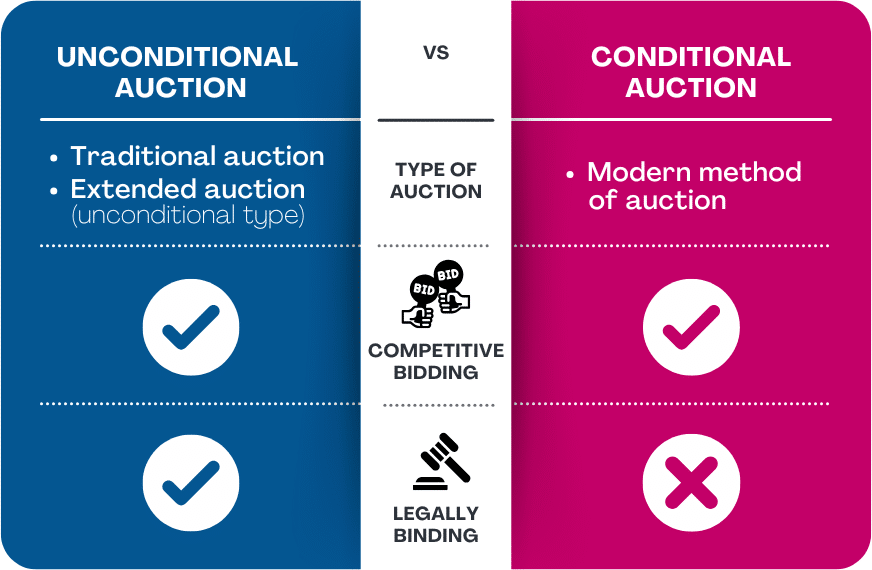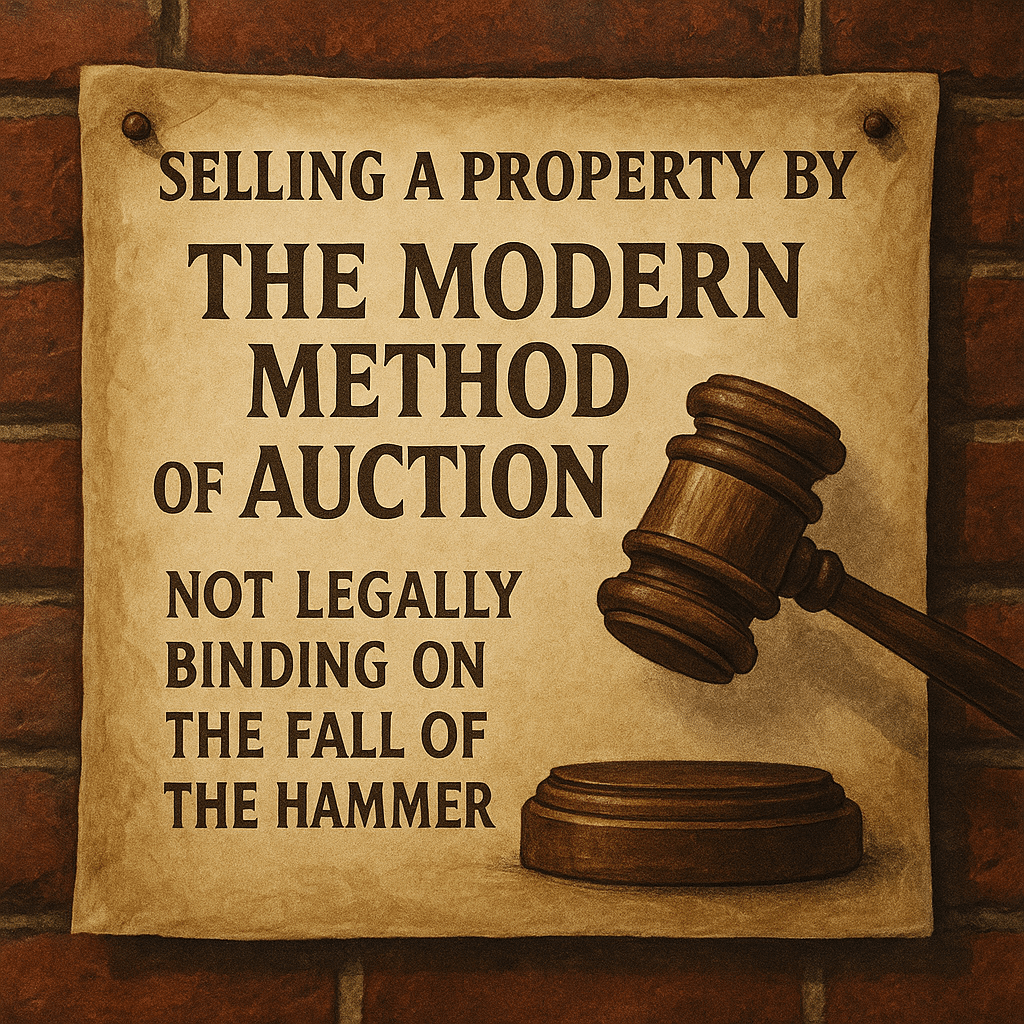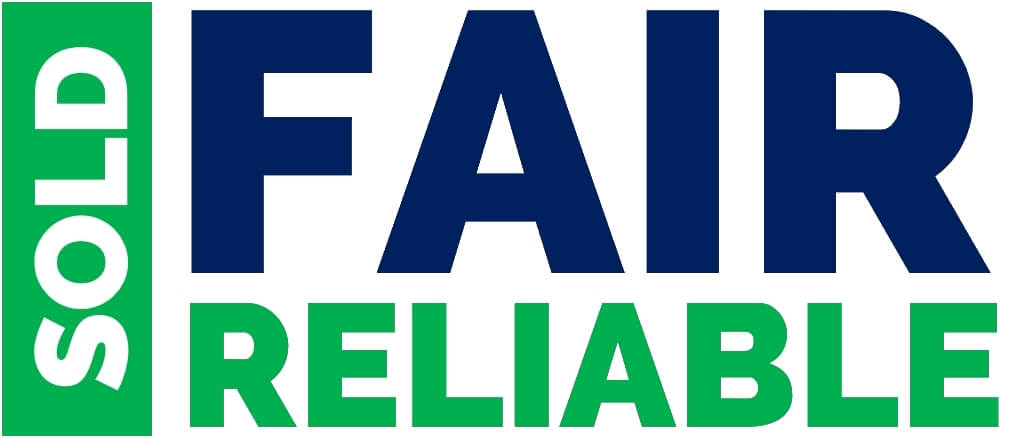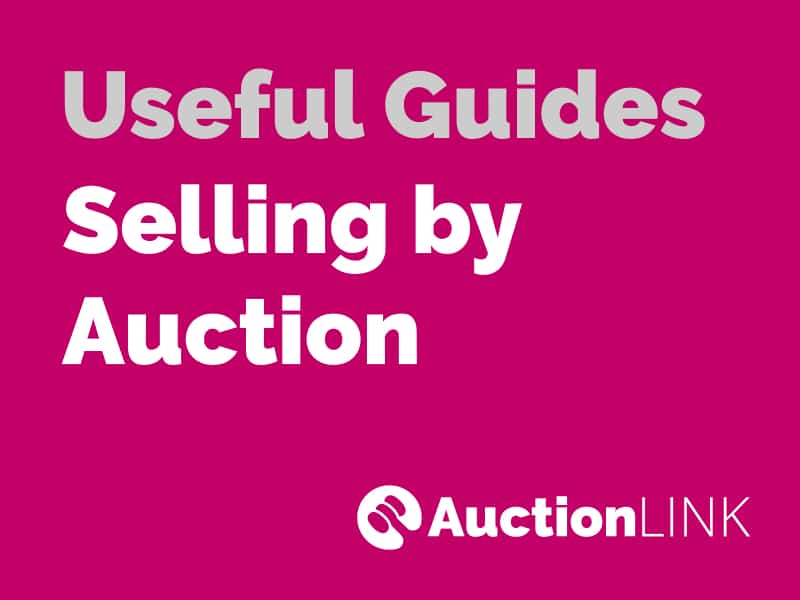Selling by The Modern Method of Auction – Pros & Cons
Has your estate agent suggested selling by modern auction? This article looks into the pros and cons of selling your house or flat by the modern method of auction. An important read before you make any decisions.
For your peace of mind we are a member of The Property Ombudsman


Selling by auction is quick and easy. Request a no-obligation auction sale estimate for your house or flat.
Choosing the right type of auction is important. We’re here to help you decide.
Interested to learn more about the easy and efficient process of selling your property by auction?
Talk to our team on 0800 862 0206
Home: Auction Link » Pros & Cons of Selling by The Modern Method of Auction
Auction by Name Only – What to Expect When Selling by the Modern Method of Auction
Thinking of selling your home by the modern method of auction? Learn the pros, cons, risks, and alternatives before you commit.
Choosing the right type of auction is important.
We’re here to help you decide.
How it Works
Benefits
Disadvantages
Popularity
Reservation Fee
Tips
Alternatives
FAQ’s
Introduction: Should You Sell by the Modern Method of Auction?
Has your estate agent recommended selling your property by the “modern method of auction”? Perhaps they have suggested you speak to their partner company who runs this type of auction service.
For many sellers who have struggled to find a buyer through the conventional estate agency route, the suggestion of an auction can sound hopeful. If your home has been sitting on the market without much interest, you might think that auction could finally be the way to get things moving.
But here’s the reality: the modern method of auction (MMoA) is not a traditional auction. It looks and feels like one on the surface, but legally it is very different. In fact, some argue that it is not a true auction at all.
Before you decide, it’s worth weighing up the pros and cons of selling by the modern method of auction.
Innovation in the Property Market
It’s always good to see new approaches in the property market. Innovation means more choice and sometimes fresh solutions to old problems. The key selling point of the modern method of auction is that it gives buyers more time to arrange a mortgage, making property sales accessible to a wider audience than traditional auctions.
However, the controversy surrounding MMoA is hard to ignore. Regulators and consumer groups have raised concerns about fairness and transparency. Critics say it is often a “fee grab” for estate agents, rather than a reliable method for sellers to secure a deal.
Understanding the Terminology
When discussing auctions, two terms matter most: unconditional and conditional sales.
What Is an Unconditional Sale?
- A legally binding sale.
- Exchange of contracts happens immediately when the auction ends.
- The buyer is locked in, and completion follows within a set period (usually 28 days).
What Is a Conditional Sale?
- Conditions apply to the buyer’s offer.
- The sale is not legally binding at the fall of the hammer.
- The buyer still has time to do checks, arrange finance, and can withdraw without legal consequence.
The modern method of auction is conditional, meaning there is no guarantee of a sale when the bidding ends.

How Does the Modern Method of Auction Work?
The process usually begins with your estate agent. If your property hasn’t sold through the normal route, they may suggest MMoA. Sometimes they recommend it upfront if they feel the home will be a tricky sale.
Here’s what typically happens:
- Referral – Your estate agent refers you to their partner auction operator.
- Reserve price agreed – You agree to a minimum reserve price and sign the auction terms.
- Marketing – The listing changes to “auction sale”, often with a lower guide price to generate interest.
- Bidding period – Buyers place bids online over four to six weeks.
- Reservation fee paid – The winning bidder must pay a non-refundable fee, often 3–5% of the purchase price or a set amount (commonly £6,000+).
- No contracts exchanged – Unlike a traditional auction, the sale remains conditional.
- 28 days to exchange contracts – The buyer has time to arrange finance and carry out due diligence.
- Completion – If the buyer proceeds, completion usually happens 28 days later. If they withdraw, you are left without a sale, but the agent keeps the fee.
Benefits of Selling by the Modern Method of Auction
While far from perfect, the modern method of auction does offer some advantages.
- Access to more buyers – Mortgage buyers can take part, not just cash investors.
- Increased exposure – Properties are advertised across estate agent channels and auction platforms.
- Competitive bidding – Multiple interested buyers can drive up the final selling price.
- No direct estate agent fees (sometimes) – Sellers are often told they won’t pay commission, as the buyer covers the reservation fee.
These benefits explain why some sellers see MMoA as a potential solution, especially in a tough market.
Disadvantages of Selling by the Modern Method of Auction
Unfortunately, the disadvantages are just as important – and in many cases, outweigh the benefits.
1. Reservation Fees Go to the Agent, Not You
The buyer’s reservation fee, often thousands of pounds, does not reduce the purchase price or come to you as the seller. It is pocketed by the auction company and estate agent.
2. Sales Can Still Take Months
Despite the “auction” label, there is nothing quick about MMoA. If the buyer needs time for mortgage approval, surveys, or legal checks, you could still be waiting months.
3. Buyers Can Pull Out
Since the sale is conditional, buyers can simply walk away. You are left with nothing to show for it, other than wasted time.
4. Legal Pack Risks
Because the sale is not binding, properties are sometimes listed before a legal pack is ready. Buyers can bid blindly, only to later withdraw when they uncover problems.
5. Bad Reputation
Consumer groups and the press have criticised MMoA for lack of transparency and inflated costs. Some agents avoid it entirely for fear of reputational damage.
6. Price Drops After Bidding
Even after “winning” the auction, buyers may try to renegotiate the price after a survey. This undermines the very idea of an auction sale.
7. Seller Lock-In
You may find yourself tied to the auction provider’s terms. Unlike a normal estate agency contract, withdrawing can be even harder.

Why Has the Modern Method of Auction Become Popular?
The popularity of MMoA can be summed up in one word: fees. Estate agents and their auction partners make money from the buyer’s reservation fee, whether the sale completes or not.
For the agent, it is a guaranteed payday. For you, it is not. That is why some agents push it heavily, while others refuse to touch it.
Does the Reservation Fee Guarantee Security of Sale?
Proponents argue that the hefty, non-refundable fee deters buyers from pulling out. There is some truth in this – losing thousands is no small thing. But buyers do still withdraw if problems arise or mortgages fall through.
In fact, the same security could be achieved by requesting a reservation deposit in a standard estate agency sale. Some independent agents already do this. The reason large chains don’t is simple: they don’t want to risk their brand reputation. By branding it as an “auction”, the responsibility shifts to the auction operator.
Where Did Conditional Auctions Come From?
Traditional auctions are almost always unconditional. When the gavel falls, the sale is binding. On rare occasions, conditions are added – such as a sale “subject to probate being granted” – but this is specific and limited.
The modern method of auction took this rare exception and built an entire model around it. By doing so, it created a hybrid that looks like an auction but functions more like a standard estate agency sale.
Tips for Sellers Considering MMoA
- Always ask whether the sale will be conditional or unconditional.
- Don’t be swayed by the word “auction” – with MMoA it doesn’t mean certainty.
- Ask where the reservation fee goes. (Hint: not into your pocket.)
- Insist on a legal pack being ready before listing.
- Weigh up alternatives – MMoA is rarely the only option.
Alternatives to the Modern Method of Auction
If MMoA doesn’t feel right for you, there are several alternatives:
Traditional Auction (Unconditional)
The classic ‘under the hammer’ approach where contracts are exchanged immediately. It is quick and secure, but usually best suited to properties that attract cash buyers. This on-the-day auction format is the one most people recognise, though setting a low reserve price is often necessary to secure a sale.
Online or Extended Unconditional Auction
A modern format where bidding takes place online over an extended period, but the sale remains binding once the auction ends. This approach combines a longer marketing window with the certainty of contracts being exchanged when the hammer falls.
Standard Estate Agency Sale
Still the most common option. While slower, it offers flexibility and allows negotiation without high fees. That said, certain types of property may be better suited to auction.
Cash House-Buying Companies
A fast sale – usually below market value – but useful if speed is a priority. Take care when dealing with property buying companies – the transaction is still a private treaty sale in England and Wales, meaning the buyer can reduce their offer at the last moment or pull out completely.
Conclusion: Should You Use the Modern Method of Auction?
The modern method of auction is an interesting idea that has gained traction largely because of estate agents’ enthusiasm for the fees it generates. But for sellers, it does not always deliver the promised certainty or speed.
The key point to remember is the difference between an unconditional sale (a true auction, with immediate exchange of contracts) and a conditional sale (where the buyer can walk away).
If your estate agent suggests MMoA, don’t accept it blindly. Ask hard questions, explore the alternatives, and make sure the method of sale works in your best interests – not just theirs.
In today’s property market, sellers are more informed and less reliant on estate agents than ever before. Use that to your advantage. Choose the sales method that genuinely works for you.
Looking to sell by the true rules of auction?
Choosing the right type of auction can make the difference between a quick and reliable sale, or a slow and protracted negotiation. Request a free & no-obligation auction sale estimate for your property.
Frequently Asked Questions About the Modern Method of Auction
What is the modern method of auction?
The modern method of auction (MMoA) is a way of selling property where buyers bid online over a set period. Unlike a traditional auction, the sale is conditional, meaning contracts are not exchanged when bidding ends. Instead, the winning bidder pays a non-refundable reservation fee and then has 28 days to exchange contracts and a further 28 days to complete.
Is the modern method of auction legally binding?
No. The modern method of auction is not legally binding at the fall of the hammer. The buyer has time to arrange finance and conduct checks before exchanging contracts. If they choose to withdraw, they lose their reservation fee, but the seller does not have a guaranteed sale.
Who pays the fees in the modern method of auction?
In most cases, the buyer pays a reservation fee to the auction company or estate agent. This is often 3–5% of the property price or a fixed minimum amount (commonly £6,000+). The fee does not go towards the purchase price. The seller may still need to pay for a legal pack and any agreed administration costs.
What are the advantages of selling by modern auction?
- Access to mortgage buyers as well as cash buyers.
- Wider marketing exposure through agents and auction platforms.
- Potential for competitive bidding to increase the price.
- Sometimes marketed as “no estate agent fees” for the seller.
What are the disadvantages of selling by modern auction?
- The reservation fee goes to the agent, not the seller.
- The sale is conditional, so the buyer can still walk away.
- The process can take months if the buyer struggles with finance.
- Properties are sometimes listed without a legal pack, increasing risks.
- Negative press and concerns about transparency in the sector.
Can a buyer get a mortgage with the modern method of auction?
Yes. Unlike traditional auctions, the modern method gives buyers extra time (usually 28 days) to arrange mortgage finance. However, this flexibility means the sale is not secure until contracts are exchanged.
What happens if the buyer pulls out?
If the buyer pulls out after paying the reservation fee, they lose that fee. The money goes to the estate agent and auction provider, not to the seller. The property remains unsold, and the seller must start again.
Is the modern method of auction the same as a traditional auction?
No. A traditional auction is unconditional: contracts are exchanged immediately, and the buyer is legally bound to complete. The modern method is conditional: there is no legal commitment until contracts are exchanged later.
What are the True Rules of Auction?
If all this talk of the modern method of auction has left you feeling uneasy, take comfort in knowing that it represents only a small corner of the auction world. Many reputable auctioneers still operate under the true, unconditional rules of auction – where contracts are exchanged the moment the hammer falls, giving both speed and certainty. By understanding the difference between conditional and unconditional sales, you can make an informed choice and find the method of sale that truly suits your circumstances.
We’ve outlined what those rules mean and what you can expect when selling through a genuine unconditional auction.
1. Binding Contract at the Fall of the Hammer
- Once the auctioneer’s hammer (or gavel) falls, a legally binding contract is formed between the seller and the highest bidder.
- Both parties are immediately committed to the sale.
2. No Further Conditions
- The buyer cannot make the sale subject to surveys, financing, or other checks after the auction.
- All due diligence must be done before bidding.
3. Transparency and Public Competition
- Bidding is open and transparent.
- All interested parties have an equal chance to bid, driving the price through open competition.
4. Auctioneer Acts as Agent
- The auctioneer represents the seller and facilitates the sale.
- They must follow fair practices and not mislead bidders.
5. Reserve Price
- Auctions have a minimum price (reserve), which must be met before the sale is valid.
- If the reserve is not met, the property may not sell.
6. No Retraction After Acceptance
- Once a bid is accepted (hammer falls), the buyer cannot back out without legal consequences (typically loss of deposit or legal action).
Prefer to talk?
Need help deciding if auction is right for you? Call 0800 862 0206 or request a call back for later.
Looking for an auction sale that benefits from both competitive bidding and a legally binding sale? Whilst we see there is a place for conditional auction sales. We think the legally binding unconditional modern auction sale is what most people are looking for when they choose to sell by auction.








